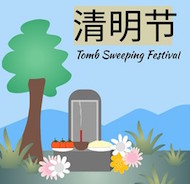Today is one of those Chinese holidays that, like most, is seeped in tradition. Every year, on the 15th day after the Spring Equinox, Chinese People celebrate Qīngmíng jié — the Tomb Sweeping Festival. This year, that’s today — April 5.
The festival has been held for more than 2,500 years, but it only became an official public holiday in China in 2008.

In order to observe Qīngmíng jié Chinese people go to the cemetery to honor, remember and celebrate the memory of their dead relatives and ancestors.
The ceremony is divided into three main parts. The first part consists of tombs and graves being tended, cleaning and removing any debris from the tombstones.
Praying is part two of the Qīngmíng ritual. A member of the family lights incense sticks, which are stuck into the ground. Family members then take turns and offer prayers to their ancestors.
During the third part of the ceremony offerings are given to the deceased. This can be in the form of food, alcohol, paper goods or so called “ghost money” being burned as a formal offering for the afterlife of the beloved. (In return for this it is believed that ancestors will bless their living family members and help them have prosperous year in today’s world.)
At the end of the entire ceremony all the family members gather around the tomb and throw colored papers in the air, toward heaven for blessing.
That’s the way the Qīngmíng festival is intended to be celebrated. But as you might expect, today’s generation has their own version of the celebration — kind of like Qīngmíng Festival 2.0.
In the modern version of the rite a big emphasis is given to the material aspects of the ceremony — paper made goods in the form of cars, smart phones, tablets and other technological gadgets are especially made for this occasion, while wealth and luck is asked in return. And — people that live too far from their ancestors tombs are now able to send flowers, candles or food through the Internet. In fact, special websites have been created for this festival addressed as “Internet memorials.” All that has to be done is select the items and make an online payment to the website and the goods will be delivered.
It’s interesting that this convenient method to honor Qīngmíng jié has been encouraged by local authorities because it’s considered eco-friendly and also reduces the risk of accidental fires during ceremonies.
Anyhow, the festival is not only a day for remembering and honoring the departed, but also a day to be spent with family outdoors or traveling in the spring after a long winter.
— 30 —
